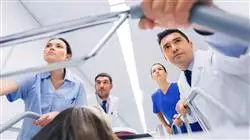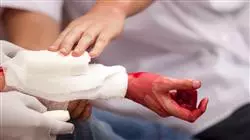University certificate
The world's largest faculty of medicine”
Introduction to the Program
Through this fully online Advanced master’s degree, you will master the most sophisticated Advanced Life Support techniques to deal with emergency cases with maximum efficiency”

According to a new report prepared by the World Health Organization, respiratory emergencies represent a significant burden for health systems on a global scale. In this regard, the organization highlights that approximately 5 million children die each year mainly due to preventable and treatable causes such as pneumonia, bronchitis or laryngotracheitis. Faced with this reality, professionals have the responsibility to incorporate into their daily clinical practice the most innovative strategies based on scientific evidence both to reduce mortality and to improve the prognosis for recovery.
In this context, TECH presents an exclusive Advanced master’s degree in Accident and Emergency Care. Designed by references in this field, the curriculum will delve into issues ranging from the implementation of the most effective advanced life support procedures or the management of complex neurological cases to the use of cutting-edge technological tools to optimize care in critical situations such as natural disasters. Thanks to this, graduates will obtain advanced clinical skills to make quick decisions, manage available resources efficiently and ensure the highest quality in patient care.
To reinforce all these concepts, TECH uses its disruptive Relearning system, which involves the progressive repetition of key concepts to ensure their proper assimilation. In addition, the university program provides graduates with a variety of real case studies, allowing professionals to exercise in simulated environments to bring them closer to the reality of emergency care. In this sense, to access the educational resources, you will only need an electronic device capable of connecting to the Internet. In addition, the syllabus includes rigorous Masterclasses given by renowned International Guest Directors.
Prestigious International Guest Directors will provide comprehensive Masterclasses on the latest advances in the proper management of out-of-hospital Accident and Emergency Care”
This Advanced master’s degree in Accident and Emergency Care contains the most complete and up-to-date scientific program on the market. The most important features include:
- The development of practical cases presented by experts in Accident and Emergency Care
- The graphic, schematic, and practical contents with which they are created, provide scientific and practical information on the disciplines that are essential for professional practice
- Practical exercises where the self-assessment process can be carried out to improve learning
- Its special emphasis on innovative methodologies in financial practice
- Theoretical lessons, questions to the expert, debate forums on controversial topics, and individual reflection assignments
- Content that is accessible from any fixed or portable device with an internet connection
You will be highly prepared to address toxicological conditions such as chemical, drug or medication abuse intoxications”
The teaching staff includes professionals belonging to the field of Finance, who bring to this program the experience of their work, as well as recognized specialists from leading companies and prestigious universities.
The multimedia content, developed with the latest educational technology, will provide the professional with situated and contextual learning, i.e., a simulated environment that will provide an immersive learning experience designed to prepare for real-life situations.
This program is designed around Problem-Based Learning, whereby the student must try to solve the different professional practice situations that arise throughout the program. For this purpose, the professional will be assisted by an innovative interactive video system created by renowned and experienced experts.
You will handle advanced diagnostic tools such as Clinical Ultrasound, Hemodynamic Monitoring and Mechanical Ventilation”

With the innovative Relearning method applied by TECH, you will not have to invest a great amount of study hours and you will focus on the most relevant concepts”
Why study at TECH?
TECH is the world’s largest online university. With an impressive catalog of more than 14,000 university programs available in 11 languages, it is positioned as a leader in employability, with a 99% job placement rate. In addition, it relies on an enormous faculty of more than 6,000 professors of the highest international renown.

Study at the world's largest online university and guarantee your professional success. The future starts at TECH”
The world’s best online university according to FORBES
The prestigious Forbes magazine, specialized in business and finance, has highlighted TECH as “the world's best online university” This is what they have recently stated in an article in their digital edition in which they echo the success story of this institution, “thanks to the academic offer it provides, the selection of its teaching staff, and an innovative learning method aimed at educating the professionals of the future”
A revolutionary study method, a cutting-edge faculty and a practical focus: the key to TECH's success.
The most complete study plans on the university scene
TECH offers the most complete study plans on the university scene, with syllabuses that cover fundamental concepts and, at the same time, the main scientific advances in their specific scientific areas. In addition, these programs are continuously being updated to guarantee students the academic vanguard and the most in-demand professional skills. In this way, the university's qualifications provide its graduates with a significant advantage to propel their careers to success.
TECH offers the most comprehensive and intensive study plans on the current university scene.
A world-class teaching staff
TECH's teaching staff is made up of more than 6,000 professors with the highest international recognition. Professors, researchers and top executives of multinational companies, including Isaiah Covington, performance coach of the Boston Celtics; Magda Romanska, principal investigator at Harvard MetaLAB; Ignacio Wistumba, chairman of the department of translational molecular pathology at MD Anderson Cancer Center; and D.W. Pine, creative director of TIME magazine, among others.
Internationally renowned experts, specialized in different branches of Health, Technology, Communication and Business, form part of the TECH faculty.
A unique learning method
TECH is the first university to use Relearning in all its programs. It is the best online learning methodology, accredited with international teaching quality certifications, provided by prestigious educational agencies. In addition, this disruptive educational model is complemented with the “Case Method”, thereby setting up a unique online teaching strategy. Innovative teaching resources are also implemented, including detailed videos, infographics and interactive summaries.
TECH combines Relearning and the Case Method in all its university programs to guarantee excellent theoretical and practical learning, studying whenever and wherever you want.
The world's largest online university
TECH is the world’s largest online university. We are the largest educational institution, with the best and widest online educational catalog, one hundred percent online and covering the vast majority of areas of knowledge. We offer a large selection of our own degrees and accredited online undergraduate and postgraduate degrees. In total, more than 14,000 university degrees, in eleven different languages, make us the largest educational largest in the world.
TECH has the world's most extensive catalog of academic and official programs, available in more than 11 languages.
Google Premier Partner
The American technology giant has awarded TECH the Google Google Premier Partner badge. This award, which is only available to 3% of the world's companies, highlights the efficient, flexible and tailored experience that this university provides to students. The recognition as a Google Premier Partner not only accredits the maximum rigor, performance and investment in TECH's digital infrastructures, but also places this university as one of the world's leading technology companies.
Google has positioned TECH in the top 3% of the world's most important technology companies by awarding it its Google Premier Partner badge.
The official online university of the NBA
TECH is the official online university of the NBA. Thanks to our agreement with the biggest league in basketball, we offer our students exclusive university programs, as well as a wide variety of educational resources focused on the business of the league and other areas of the sports industry. Each program is made up of a uniquely designed syllabus and features exceptional guest hosts: professionals with a distinguished sports background who will offer their expertise on the most relevant topics.
TECH has been selected by the NBA, the world's top basketball league, as its official online university.
The top-rated university by its students
Students have positioned TECH as the world's top-rated university on the main review websites, with a highest rating of 4.9 out of 5, obtained from more than 1,000 reviews. These results consolidate TECH as the benchmark university institution at an international level, reflecting the excellence and positive impact of its educational model.” reflecting the excellence and positive impact of its educational model.”
TECH is the world’s top-rated university by its students.
Leaders in employability
TECH has managed to become the leading university in employability. 99% of its students obtain jobs in the academic field they have studied, within one year of completing any of the university's programs. A similar number achieve immediate career enhancement. All this thanks to a study methodology that bases its effectiveness on the acquisition of practical skills, which are absolutely necessary for professional development.
99% of TECH graduates find a job within a year of completing their studies.
Advanced Master's Degree in Accident and Emergency Care
Medical care in Accident and Emergency requires highly trained medical personnel to address the symptoms presented by patients in critical conditions, not only due to the complexity of these conditions but also because of the risks they pose to the patients' lives. In addition to providing high-quality service, the care provided by these professionals must be quick and effective to respond to urgent needs, whether in a hospital or out-of-hospital setting. At TECH Global University, we have developed the Advanced Master's Degree in Accident and Emergency Care, a program focused on addressing the most relevant concepts and topics to specialize in this discipline. With a postgraduate qualification of the highest academic level, you will have the opportunity to achieve both academic and professional excellence.
Specialize at the largest School of Medicine
At the largest School of Medicine, you will have the opportunity to access a top-tier postgraduate program, equipped with the most advanced technological and human resources to enhance your skills in Accident and Emergency Care. You will review the fundamentals of urgent healthcare assistance, apply the clinical and non-clinical competencies of emergency medicine, prioritize, organize, and manage patient care more efficiently through triage. Additionally, you will manage commonly used medications and identify the various traumatic pathologies of patients in critical condition. This will enable you to resolve complex emergency and risk situations in real environments and stand out through excellence. With our Advanced Master's Degree, you will boost your career growth and advance toward achieving your professional goals.







